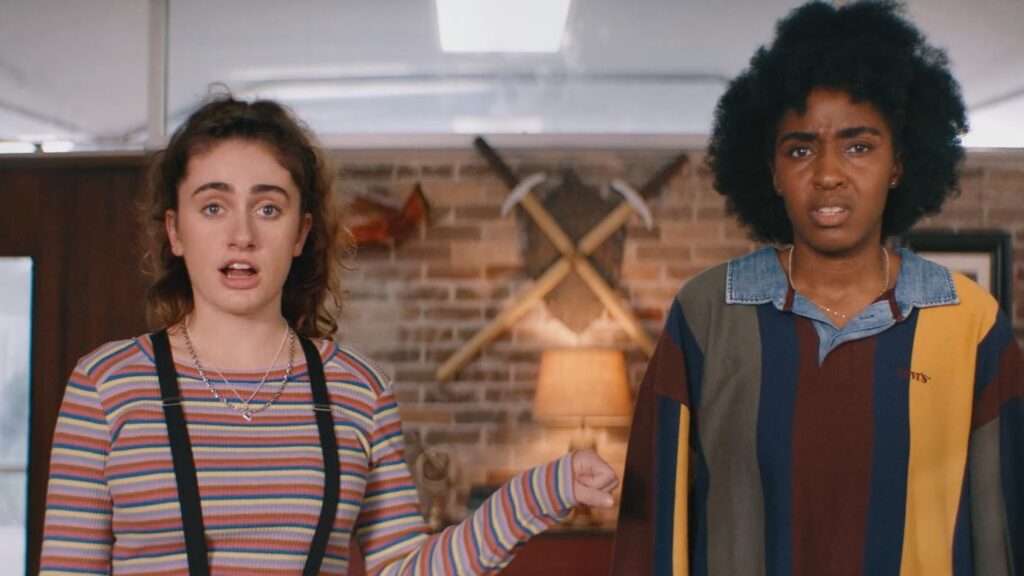
Justifying your own unpopularity is harder than it used to be. In the past, the ostracized heroes at the center of coming-of-age stories could take solace in the recognition that their tormentors were either stupid or bigoted; the bullying they faced was simply a consequence of the ruling class failing to perceive their true worth. But the nerds of Booksmart discovered that their partying brethren were also headed to the Ivy League, and now the losers of Bottoms can’t attribute the everyday cruelty they experience to insecurity or small-mindedness. “They don’t hate us because we’re gay,” Josie (Ayo Edebiri) says with gloomy honesty to her best friend, PJ (Rachel Sennott), as they watch a jock congratulate an effeminate actor on his performance in the school musical. “They hate us because we’re ugly and untalented.”
That assessment is unduly self-deprecating, though the wardrobe department has joined forces with Edebiri’s lack of vanity to make Josie look as frumpy as possible. (The first time we see her, she’s trying to stack multiple baseball caps atop her haywire afro.) But it’s crucial for Bottoms to establish its heroines’ putative undesirability in order to lay the groundwork for its story of improbable triumph and feminist upheaval. Directed by Emma Seligman from a script she wrote with Sennott, it’s an affirming movie that tells the tale of a marginalized sect rising up against its oppressors, claiming a measure of power and upending the entrenched social order. In related news, it’s about punching cheerleaders in the face.
Such tonal dissonance is quickly becoming Seligman’s calling card. Her first feature, Shiva Baby, starred Sennott as a collegian who finds herself trapped in a house full of intimates and relatives, desperate to escape; it was a sharply written character study that felt, in aural and visual terms, like a horror movie. Bottoms is less controlled but more ambitious, aiming to spice up the hoary coming-of-age genre with vitriolic satire and fantastical violence.
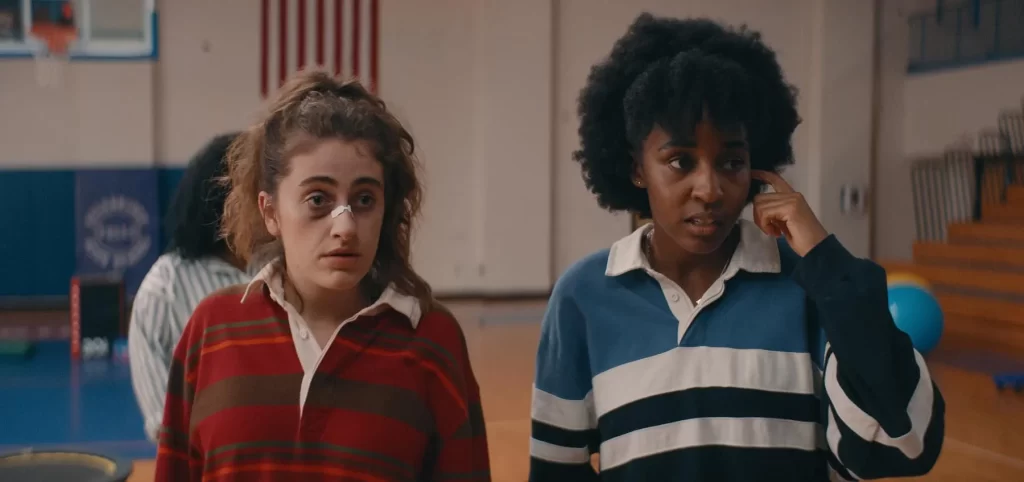
What’s interesting about Bottoms is that its broader story isn’t all that interesting. It instead traffics in plentiful teen-movie clichés: the best friends who forge their bond from their stature as social pariahs, the long-simmering crushes on unattainable hotties, the cool teacher (Marshawn Lynch!?) who doesn’t play by the rules, and of course the Big Secret that inevitably gets exposed at the worst possible time. But it commits itself so completely to its maniacal vision of a heightened scholastic universe that it mostly manages to feel provocative and fresh. Sure, you’re familiar with the scene where the upstarts’ grand plan gets foiled, but you’ve never seen it unfold in the context of a pint-sized lesbian getting body-slammed by a roid-raging wrestler.
That’s crazy, but it isn’t silly. Seligman’s gambit here is to wield narrative absurdity as a cover to smuggle in trenchant themes and emotional realism. The main plot of Bottoms—in which Josie and PJ, despite being supremely unathletic and thoroughly sheltered, contrive to spearhead a self-defense club for their female classmates as a pretext to pursue their respective dream girls—isn’t remotely credible, nor is it intended to be. Yet despite its preposterousness, the movie still aims to be taken seriously insofar as it grapples with stereotypical gender roles and feminine solidarity.
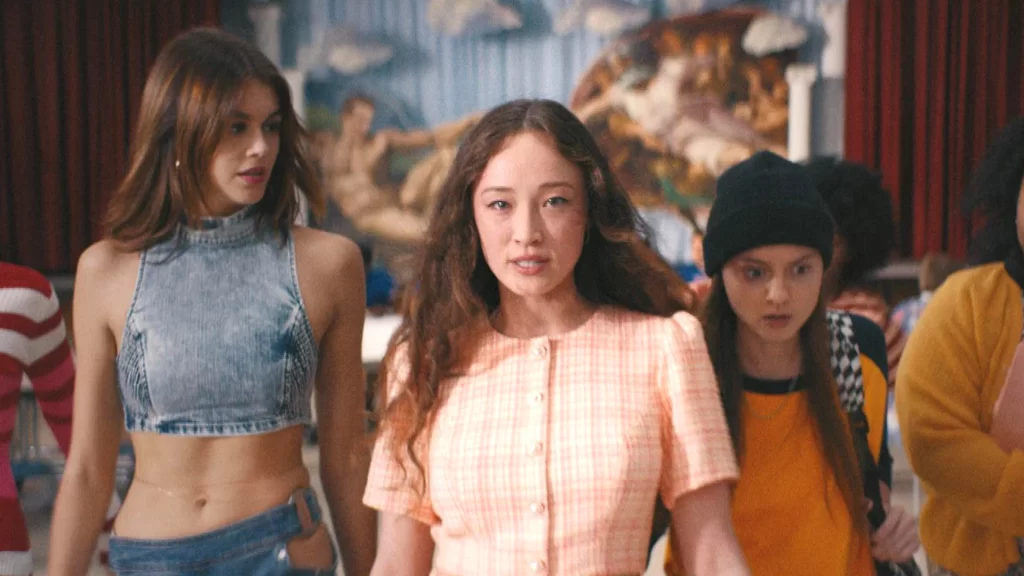
Those messages don’t always shine through with the utmost clarity, as Seligman’s fervent dedication to outlandishness has the upshot of obscuring her ideas. Bottoms may be a work of intelligence and incitement, but it also wants to succeed as an actual high school comedy. To be fair, it lands plenty of punches; I laughed at one character’s attempt to describe the actions of a quarterback (“He catches the ball, or maybe he throws the ball”), and I positively chortled when cheerleaders at a pep rally purported to gear up for a complex routine only to just pour water on one babe’s white T-shirt. But much of the dialogue feels improvised and stilted. The closing credits feature ’90s-style outtakes in which actors flub lines or miss marks, and that sense of sloppiness pervades the film proper as well, suggesting a scattershot approach that flails as often as it connects.
Part of the movie’s problem lies in its comic premise: that teenagers bludgeoning one another is inherently funny. I don’t necessarily disagree; movies as varied as Heathers, Mean Girls, and Jennifer’s Body have located humor in adolescent violence. But Seligman’s staging of her distaff Fight Club’s exploits is lazy and self-satisfied. She regularly deploys the same pattern: One combatant will deliver an improbable, bone-crunching blow to another girl’s jaw, followed by reaction shots of observers wincing “Ohhh!” It’s a method that can work sporadically—when Josie first bloodies PJ’s nose with a sharp jab, it’s a shock that prompts nervous laughter—but constant repetition precludes the surprise and deadens the appeal.
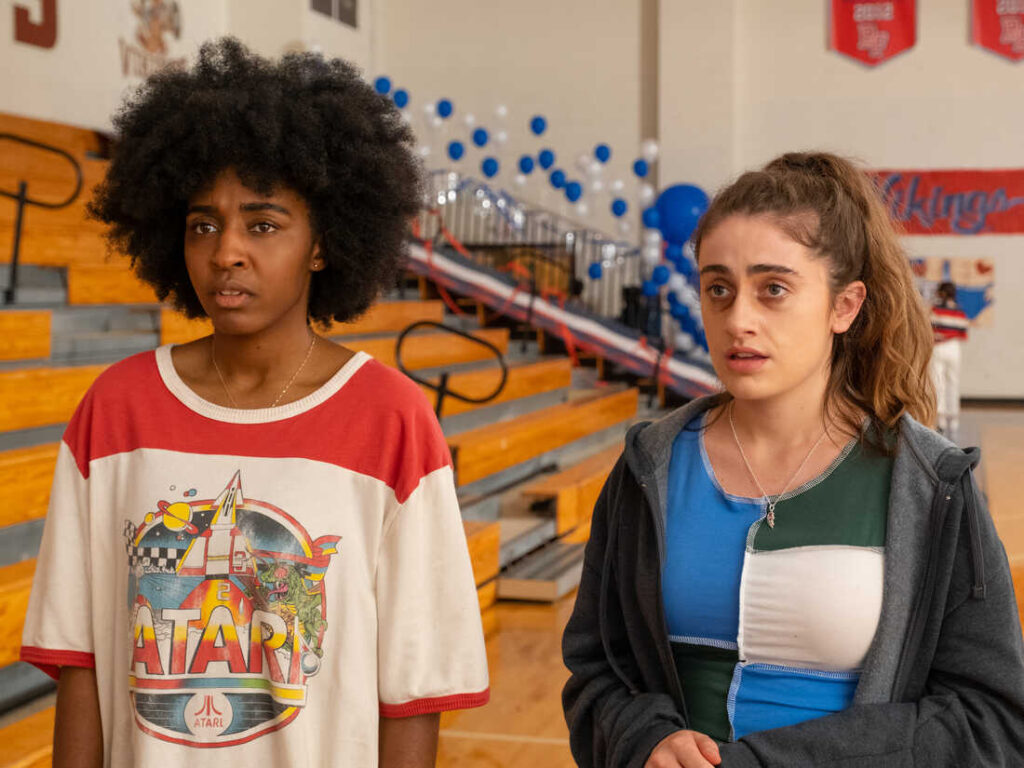
Yet while Bottoms’ surface level has its problems, it nonetheless features underlying layers of intrigue and oddness. To begin with, its lead performances refuse to adhere to the genre’s quirky formula. Edebiri, capping off a very busy summer—in addition to supporting roles in Theater Camp and Teenage Mutant Ninja Turtles (not to mention Across the Spider-Verse), she continued excelling on the small screen in The Bear—makes Josie achingly pathetic; her early monologue prophesying an evangelical future is so saturated with anguished resignation, you can’t help but root for her to find love with Isabel (Havana Rose Liu), the popular cheerleader she pines for. And where Edebiri is sweetly helpless, Sennott is defiantly unlikable, scrubbing all vestiges of lovable loserdom in favor of unapologetic lust and noxious egoism. All PJ cares about is getting laid—the particular target of her ardor is a seemingly vapid waif named Brittany (Kaia Gerber)—and her single-minded pursuit makes Sennott’s self-absorbed podcaster in Bodies Bodies Bodies look like a saint by comparison.
That might not sound like the ideal protagonist of a coming-of-age story, but one of Bottoms’ insights is that even if young people aren’t villainous, they can still be horny, selfish, and mean. The secondary characters here aren’t exactly deep—the football players, in fact, are spectacularly shallow (and also, from how Seligman choreographs their athletic feats in the background, very bad at sports)—but the movie still exhibits a perceptive view of queer teenage life that feels, despite the surrounding outrageousness, sensitive and sincere. Its best sequence juxtaposes Josie and PJ’s respective bedroom sessions with Isabel and Brittany, and the asymmetry of their encounters is piercing; one indulges in buoyant fantasy, while the other crashes into painful reality with the simple line, “I’m straight.”
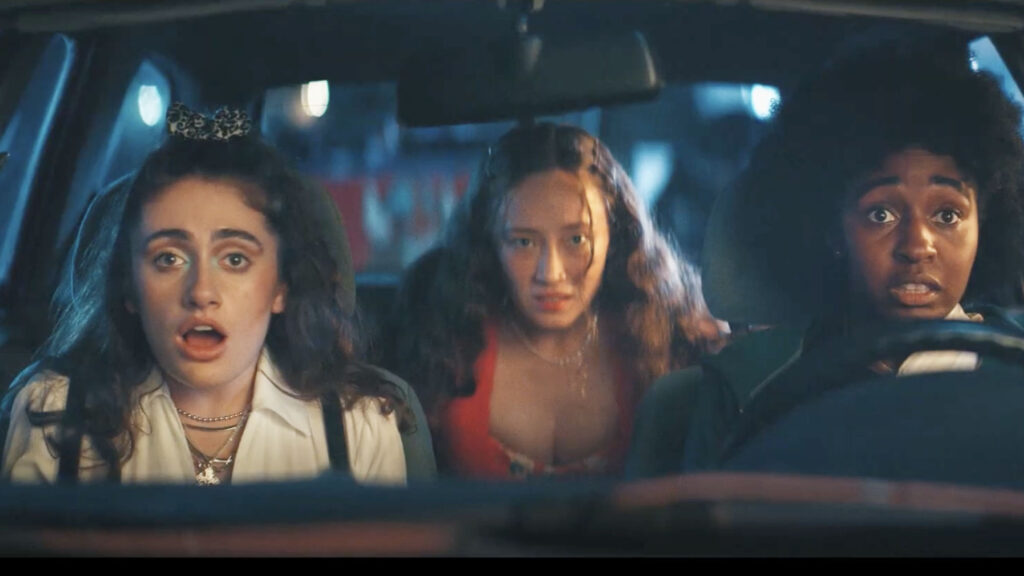
But let’s not get carried away—or rather, let’s recognize that Bottoms revels in getting carried away. There are no third rails here—Seligman piles on jokes about school shootings, pornography, abusive student-teacher relationships, and plenty more—and the movie takes obvious pride in how far it stretches and warps its demented premise. The climax, which takes place at a homecoming game where the opposing players are literal murderers, is so perversely deranged, it’s hard to tell whether to be aghast or amazed.
Which is probably the whole idea. As a satire of high school anxiety, Bottoms isn’t as smart or acerbic as it wants to be. But it is new, and its willingness to go to extremes makes it rewarding as well as off-putting. As extracurricular clubs go, it probably won’t help your college application, but the kids who join it sure seem to be having fun.
Grade: B-
Jeremy Beck is the editor-in-chief of MovieManifesto. He watches more movies and television than he probably should.
